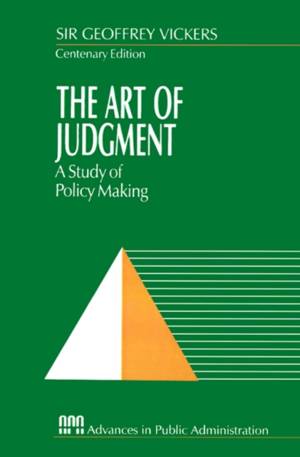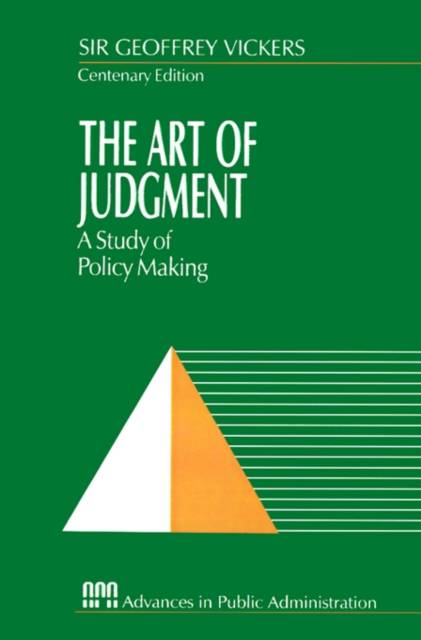
- Retrait gratuit dans votre magasin Club
- 7.000.000 titres dans notre catalogue
- Payer en toute sécurité
- Toujours un magasin près de chez vous
- Retrait gratuit dans votre magasin Club
- 7.000.0000 titres dans notre catalogue
- Payer en toute sécurité
- Toujours un magasin près de chez vous
Description
Sir Geoffrey Vickers taught us that a value-free judgment would be literally worthless. Human systems become recognizable as more than machines only as they honor (or betray) valued norms like impartiality or responsiveness, respect or productivity, or combinations of these. So all management and administration, all planning political action, depend not just on mechanical rule-following, but on practical goal-setting too: on appreciative judgments constructed in the face of ambiguity and uncertainty about what a rule, obligation, or goal really means. The insights of The Art of Judgment will guide us in these fields for years to come. --John Forester, Cornell University "This book is very worthwhile reading for those engaged in teaching public administration." --Teaching Public Administration "To anyone familiar with the work of Sir Geoffrey Vickers (1894-1982) this centenary edition of The Art of Judgment will mark a welcome reappearance of a book that was far ahead of its time when originally published thirty years ago. For those new to Vickers′s thought, it should be intellectually energizing to discover a body of thought so keenly applicable to understanding and dealing with the complex issues of public affairs at the dawn of a new century. This centenary edition contains a new introduction by Guy B. Adams, Scott D. N. Cook, and Baynard L. Catron, a biographical essay on Sir Geoffrey Vickers by Margaret Blunden, as well as the entire original text of The Art of Judgment. In recent years, many of the concepts central to the study of organizations have been called into question. This study provides a fresh foundation for the exercise of judgment in policy and management, particularly for those interested in an interpretive and critical approach to the study of organizations." --Guy Adams, University of Missouri-Columbia "For all its theoretical sophistication, the crucial aspect of Vickers′s work is its grounding in his experience in the real-life practice of policy making in which such complexity is the norm. Thirty years after its initial publication, The Art of Judgment remains worthwhile reading for all students and policy makers." --Canadian Public Administration For the past 10 years, The Art of Judgment was published and distributed solely in the United Kingdom. Now this centenary edition--containing an intriguing new foreword explaining why Vickers′s work is still on the cutting-edge as well as a bio-essay on Sir Geoffrey Vickers--is once again available in the United States. Vickers, a man who was truly ahead of his time, dealt with complex issues in public administration in the 20th century. The Art of Judgment, both in the past and still today, speaks to the student, academic, and practitioner interested in understanding decision making in organizational settings. Written in an accessible and lively style, this work remains a timely study that transcends both a narrow and scientific view of administrative behavior and lays the groundwork for a view of management thought and action grounded in the world of human experience. The Art of Judgment provides a seminal work for scholars and students seeking to develop an interpretive and critical account of management and organization.
Spécifications
Parties prenantes
- Auteur(s) :
- Editeur:
Contenu
- Nombre de pages :
- 232
- Langue:
- Anglais
- Collection :
- Tome:
- n° 3
Caractéristiques
- EAN:
- 9780803973633
- Date de parution :
- 01-12-95
- Format:
- Livre broché
- Format numérique:
- Trade paperback (VS)
- Dimensions :
- 152 mm x 229 mm
- Poids :
- 508 g

Les avis
Nous publions uniquement les avis qui respectent les conditions requises. Consultez nos conditions pour les avis.






